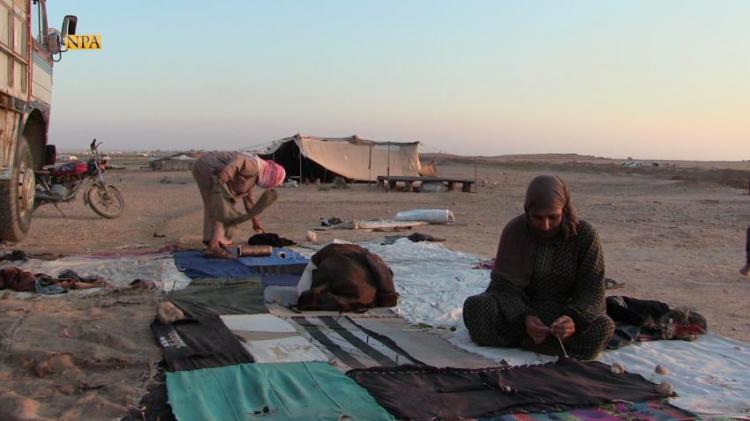Bedouin and cattle breeding in Syria are disappearing
Raqqa – North-Press Agency
Ahmed al-Hassan
Syria’s Bedouin lifestyle has significantly declined since the outbreak of the Syrian crisis in 2011 and the military operations.
Thousands of Syrian Bedouins rely on cattle breeding to secure their livelihood, but after the outbreak of the crisis, the formation of the armed opposition groups and the spread of looting and indiscriminate arrests in those areas, the vast majority of Bedouin were forced to flee to areas in the east of Euphrates river, seeking for safety and securing their livelihood.
However, the emergence of the Islamic State (ISIS) group and the siege that the region had witnessed in the recent years in order to defeat ISIS, together with the years of war have ended this livestock.
Bedouin people were forced to sell their sheep due to the lack of pastures and the increase of its prices during the period of ISIS control, which led to a significant deterioration of their living situation.
Many of them resorted to work in other fields such as agriculture, industry and other works to secure their living.
Sabhah al-Khalaf is a displaced woman from Homs countryside, who lives with her old husband and her young children in a tent where the summer sun has torn parts of their tent, so she mends it with the garments she collected from the village next to her before winter comes.
Sabhah told North-Press: “We had a thousand sheep and we didn’t need anyone, but we lost everything after the war had out-broken, so we became waiting for the agriculture seasons to work”.
She added that they have not received any help from any authorities nor organizations, “although our situation is very tragic and we no longer can tolerate”, she said.
Hamdan al-Nazzal, a displaced person from Hama countryside, who worked as a shepherd in the Syrian Desert (al-Badiya) told North-Press about his suffering: “We were depending on Allah and on our sheep in our living, but now we have nothing of those cattle.”
Al-Nazzal explained that as a result of the loss of these sheep, his children were forced to work in other fields, “my children work different jobs they do not master, but the need had forced us to do so,” he said.
Some Bedouins have sold their sheep and worked in trade and other small businesses like the residents in those areas where they fled to, in order to integrate and provide a stable life for their children.
Musa al-Khallouf, a displaced person from Homs countryside was working with his family in cattle breeding but he was forced to sell his sheep and work in selling fuel in a small shop in the village of Royan, west of Raqqa.
“We sold our sheep because of the war, and I rented this shop to secure our living,” he said.
Mohammed al-Saleh another displaced person from al-Sukhna in Homs countryside said: “We don’t have enough experience to work in agriculture or industry, we are shepherds, but the war had forced us to work in these jobs after we had lost our sheep,” calling on the humanitarian organizations to help them under these circumstances and poverty.
Bedouin IDPs are in random camps in the outskirts of Raqqa, where the number of these camps has reached 28 camps, according to Ahmed al-Ahmad, the head of the relief office of the Social Affairs and Labor Committee in Raqqa Civil Council, who indicated that there are about 4,300 Bedouin IDPs, most of them were shepherds.
In the past, many Bedouin had bought lands and built mud houses on the outskirts of the villages, in an attempt to integrate into society and learn new professions.
Cattle breeding was considered one of the most important sources to meet the needs of the local markets of milk products such as dairy, cheese, etc. It was also an important source to secure the market needs of meat.

